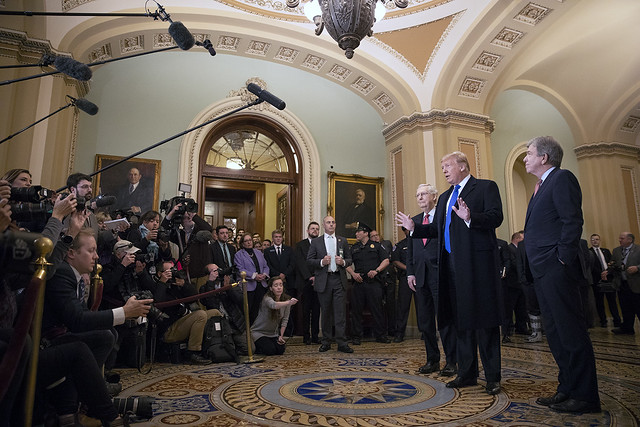Trump Sues Oversight Committee: Valid Move or Aggressive Delay Tactic?
The lawsuit is not likely to prevail on the merits. But it’s consistent with the president’s aggressive stance toward Congress and could have the effect of tying up the committee in a lengthy legal process.

Published by The Lawfare Institute
in Cooperation With

In an unprecedented move, the sitting president of the United States on April 22 sued, in his personal capacity, a congressional committee to try to prevent that committee from obtaining documents and information from a third party that had been served with a congressional subpoena. The complaint was filed in the U.S. District Court for the District of Columbia by President Trump and six of his companies against House Oversight and Reform Committee Chairman Elijah Cummings and Trump’s longtime accounting firm Mazars USA LLP. Much of the text of the complaint focuses not on legal arguments but, rather, umbrage-filled statements impugning House Democrats’ motives and process in issuing the subpoena. Yet the legal arguments echo ones White House lawyers are making across the board in response to multiple House committee oversight actions.
Is there any merit to the legal arguments in the complaint? How can the president sue to prevent a third party from complying with a subpoena? Does the court have jurisdiction to decide the case? How long will the legal process take—and how might it end?
Although there is precedent for courts entertaining suits by third parties to enjoin compliance with a subpoena, Trump is not likely to prevail on the merits. Courts have consistently affirmed that Congress’s investigative authority is broad, and the committee’s subpoena was validly issued. But the lawsuit could nonetheless have the effect of tying up the committee in a lengthy legal process that may delay compliance with the subpoena beyond the conclusion of the 2020 presidential election.
Background
At a hearing before the House Committee on Oversight and Reform on Feb. 27, the president’s former lawyer and fixer Michael Cohen testified that Trump frequently changed the estimated value of his assets and liabilities on financial statements prepared by Mazars and other firms, inflating or deflating the value of assets depending on the purpose for which the statements were used. Cohen provided financial statements from 2011, 2012 and 2013 to the committee that raised questions about the president’s representations of his financial affairs on forms and other disclosures relating to the president’s debts.
On March 20, Chairman Elijah Cummings sent Mazars a letter requesting eight years of financial documents for Trump and seven Trump-owned entities, including financial statements, periodic financial reports and auditors’ reports and other documents, underlying source documents used in the preparation of such reports, communications between the Trump organizations and Donald Bender (a partner in the firm), and “all communications related to potential concerns that records, documents, explanations, or other information, including significant judgments, provided by Donald J. Trump or other individuals from the Trump Organization, were incomplete, inaccurate, or otherwise unsatisfactory.” The letter cites House Rule X, which charges the Committee on Oversight and Reform with conducting oversight of “the operation of Government activities at all levels, including the Executive Office of the President.”
On March 27, Mazars communicated to the committee that it could not voluntarily turn over the requested documents based on accounting rules and laws barring the firm from providing client information without a validly issued and enforceable subpoena. On April 12, Cummings sent a memo to members of the committee indicating members could provide their views before the subpoena was issued. Cummings pointed to the committee’s “full authority to investigate whether the President may have engaged in illegal conduct before and during his tenure in office” and described the committee’s investigation as an effort “to determine whether he has undisclosed conflicts of interest that may impair his ability to make impartial policy decisions, to assess whether he is complying with the Emoluments Clauses of the Constitution, and to review whether he has accurately reported his finances to the Office of Government Ethics and other federal entities.” On April 15, Ranking Member Jim Jordan sent Cummings a letter objecting to the subpoena on substantive and process grounds. Cummings issued the subpoena later that day, requesting documents from 2009 to the present.
On April 22, President Trump and the Trump Organization filed their lawsuit against Cummings, Cummings’s chief investigative counsel and Mazars. The complaint seeks, among other things, a permanent injunction of the subpoena and any actions taken to enforce it, and a temporary restraining order and preliminary injunction against Mazars from producing the requested information. It argues that there is no legitimate legislative purpose for subpoenaing Trump’s financial records from his accountant, so the subpoena should be deemed invalid and unenforceable. It also implies that the subpoena may be defective because the procedures preceding its issuance were questionable. The complaint includes Mazars as a defendant “to ensure that Plaintiffs can obtain effective relief.”
As I wrote on Lawfare a few weeks ago, the Trump White House has been using the argument that Congress has no legitimate legislative purpose in a matter as a justification to refuse to comply with requests for information and documents from multiple House committees in connection with multiple oversight investigations. According to information provided by two senior administration officials, the Washington Post reported that the White House has refused to share documents requested in multiple oversight inquiries and is “intent on challenging most, if not all, House Democrats’ document requests.” To put an even finer point on it, this week Trump himself told reporters, “We’re fighting all of the subpoenas.”
In suing Cummings, Trump is deploying this argument in his personal capacity to fend off congressional requests to third parties for documents.
Eastland v. USSF
The complaint relies on Eastland v. U.S. Servicemen’s Fund, 421 U.S. 491 (1975), for the proposition that the court has the power to declare the subpoena invalid and enjoin its enforcement. The issue in Eastland was whether a federal court may enjoin the issuance by Congress of a subpoena that directed a bank to produce the bank records of an organization that claimed a First Amendment privilege status for the records, on the ground that the records were the equivalent of confidential membership lists.
The United States Servicemen’s Fund, Inc. (USSF) was a nonprofit membership corporation supported by contributions that established meeting spaces near domestic military installations and published “underground” newspapers meant to communicate, to service members, opposition to the United States’s involvement in anti-communism efforts in Southeast Asia. In early 1970, a Senate resolution authorized the Subcommittee on Internal Security to study and investigate the administration, operation and enforcement of the Internal Security Act of 1950, including the “extent, nature, and effect of subversive activities in the United States” and directed inquiry concerning “infiltration by persons who are or may be under the domination of the foreign government.” The subcommittee began an inquiry into the activities of USSF and requested the organization’s bank records. USSF argued that the bank’s compliance with such a subpoena would infringe on the organization’s First Amendment rights because the purpose of the subpoena was to “harass, chill, punish and deter” USSF and its members in the exercise of their First Amendment rights of freedom of the press and association.
The Supreme Court found that the district court properly entertained the action initially because there is “a significant difference between a subpoena that seeks information directly from a party and one that seeks the same information from a third person. In the former case, the party can resist, and thereby test the subpoena; in the latter case, however, unless a court may inquire to determine whether a legitimate legislative purpose is present … compliance by the third person could frustrate any judicial inquiry.” The court then rejected USSF’s arguments and reaffirmed that if members of Congress are acting within the legitimate legislative sphere, the Speech or Debate Clause is an absolute bar to interference in the investigation by the judicial branch.
Watkins v. United States
The question, then, is whether Cummings’s subpoena of Trump’s financial information is part of a legitimate legislative purpose. The answer is almost certainly “yes.”
The power of Congress to investigate and obtain information is very broad. While there is no express provision in the Constitution that addresses the investigative power, the Supreme Court has firmly established that such power is so essential to the legislative function as to be implied from the general vesting of legislative powers in Congress. Trump’s complaint seeks to rely on Watkins v. United States, 354 U.S. 178 (1957), a McCarthy-era case, to support an argument that there is no valid legislative purpose to Cummings’s inquiry.
Notably, the assertion that there is no valid legislative purpose for the committee’s inquiry is the same argument the White House is using to oppose congressional requests for information from the administration. White House counsel Pat Cipollone, in his March 4 letter to Cummings regarding the committee’s inquiry into the White House’s handling of security clearances, relied on the same case to argue that because Congress derives its oversight authority from its legislative powers, the White House must ensure that any request from the committee serves a legitimate legislative purpose. The White House, in essence, sought to reverse the traditional presumption in informational struggles between the two branches—that Congress is generally entitled to receive information and it is the executive branch that must make a convincing argument regarding why withholding such information either protects national security or is in the public interest in order to rely on a claim of executive privilege.
But such claims are disingenuous. The Supreme Court has affirmed over and over that the power to investigate implied by the Constitution’s grant of legislative power to Congress is very broad. Indeed, a portion of the Watkins opinion makes this point:
The power of the Congress to conduct investigations is inherent in the legislative process. That power is broad. It encompasses inquiries concerning the administration of existing laws, as well as proposed or possibly needed statutes. It includes surveys of defects in our social, economic or political system for the purpose of enabling the Congress to remedy them. It comprehends probes into departments of the Federal Government to expose corruption, inefficiency or waste. But, broad as is this power of inquiry, it is not unlimited.
So what was the limitation on Congress’s investigative power in Watkins? John Watkins was a private citizen and a labor organizer for the United Autoworkers International Union who in 1954 appeared before Senator Joseph McCarthy’s House Un-American Activities Committee. When he refused to answer questions about the communist loyalties of several of his acquaintances, he was convicted of contempt of Congress. The Supreme Court found that his conviction for contempt was invalid under the Due Process Clause of the Fifth Amendment. The court stated:
There is no general authority to expose the private affairs of individuals without justification in terms of the functions of the Congress. This was freely conceded by the Solicitor General in his argument of this case. Nor is the Congress a law enforcement or trial agency. These are functions of the executive and judicial departments of government. No inquiry is an end in itself; it must be related to, and in furtherance of, a legitimate task of the Congress. Investigations conducted solely for the personal aggrandizement of the investigators or to “punish” those investigated are indefensible.
Viewed in context, Trump’s reliance on the Watkins case is not persuasive: Unlike the House Un-American Activities Committee, the oversight committee’s investigation is not an unmoored fishing expedition into private citizens’ private lives. It is an investigation to determine whether the president of the United States has undisclosed conflicts of interest that may impair his ability to make impartial policy decisions on behalf of the nation, to assess whether Trump is complying with the Emoluments Clauses of the Constitution, and to verify whether Trump has accurately reported his finances to the Office of Government Ethics and other federal entities.
Cummings’s investigative aims fall squarely within Congress’s broad legislative and investigative authority. Verifying the adequacy and accurateness of federal financial disclosure forms is squarely within the oversight role of Congress. The Foreign Emoluments Clause of the Constitution specifically provides a role for Congress: “No Person holding any Office of Profit or Trust under [the United States], shall, without the Consent of the Congress, accept of any present, Emolument, Office, or Title, of any kind whatever, from any King, Prince, or foreign State” (emphasis added). Evidence that a president or members of his family received bribes or other financial benefit in exchange for favorable official action would be grounds for impeachment.
The Name of the Game: Delay, Delay, Delay
In the absence of any convincing substantive legal merits, the lawsuit’s point seems mostly to be delaying production of the materials from Mazars. For the president’s purposes, lengthy court proceedings may achieve the same purpose as a victory in the case. There is every reason to believe that the principal reason the president is seeking to delay the release of such materials is so that they won’t have an impact on the 2020 election.
In the Eastland case, the Supreme Court self-consciously noted that “private civil actions … may be used to delay and disrupt the legislative function…. [W]hether a criminal action is instituted by the Executive Branch, or a civil action is brought by private parties, judicial power is still brought to bear on Members of Congress and legislative independence is imperiled.” The court goes on to state:
This case illustrates vividly the harm that judicial interference may cause. A legislative inquiry has been frustrated for nearly five years, during which the Members and their aide have been obliged to devote time to consultation with their counsel concerning the litigation, and have been distracted from the purpose of their inquiry. The [Speech and Debate] Clause was written to prevent the need to be confronted by such “questioning” and to forbid invocation of judicial power to challenge the wisdom of Congress’ use of its investigative authority.
But it is not clear that the ruling in the Eastland case will necessarily mean that the president’s case against the committee is resolved quickly. The court would need to decide whether it has jurisdiction to hear the case and, if it decides it does, a consideration of the merits would follow. Even this seemingly simple process could take months, if not years, to resolve if the president appeals the case to the fullest extent—even to the Supreme Court.
Daring Congress to Impeach?
The president’s approach in this case is consistent with all of the responses the White House has made to oversight by Congress this year. The Washington Post reported on April 23 that the administration directed a former White House official, Carl Kline, not to comply with a subpoena from the House oversight committee in connection with the committee’s investigation of the handling of security clearances. Trump has also indicated he will oppose current and former White House aides providing testimony to Congress in connection with the release of the redacted Mueller report even though it seems the White House has already waived executive privilege. The Treasury Department is in the process of deciding whether to defy a clear statutory obligation to comply with a request from the House Committee on Ways and Means to turn over six years of President Trump’s tax returns.
Which brings us to the next question: Could these efforts to stiff-arm Congress on access to information be grounds for impeachment of the president? Article 3 of the Articles of Impeachment adopted by the House Judiciary Committee on July 27, 1974, provides:
In his conduct of the office of President of the United States, Richard M. Nixon, contrary to his oath faithfully to execute the office of President of the United States and, to the best of his ability, preserve, protect, and defend the Constitution of the United States, and in violation of his constitutional duty to take care that the laws be faithfully executed, has failed without lawful cause or excuse to produce papers and things as directed by duly authorized subpoenas issued by the Committee on the Judiciary of the House of Representatives … and willfully disobeyed such subpoenas. The subpoenaed papers and things were deemed necessary by the Committee in order to resolve by direct evidence fundamental, factual questions relating to Presidential direction, knowledge or approval of actions demonstrated by other evidence to be substantial grounds for impeachment of the President. In refusing to produce these papers and things Richard M. Nixon, substituting his judgment as to what materials were necessary for the inquiry, interposed the powers of the Presidency against the the lawful subpoenas of the House of Representatives, thereby assuming to himself functions and judgments necessary to the exercise of the sole power of impeachment vested by the Constitution in the House of Representatives.
Robust disagreement between the executive and legislative branches over access to information and testimony is not unusual, and many prior presidents have been taken to court by congressional committees over the years. The president has the right to look to the courts for a decision on the proper scope of executive privilege and other lawful bases to decline to answer a congressional subpoena for testimony or documents. But if the courts make utterly clear that these arguments have no legal merit, the president must comply. If he does not, or if he pursues every dilatory legal tactic to avoid complying, such a pattern of baseless obstruction of valid congressional subpoenas could provide grounds for an article of impeachment much like the one filed against Nixon.





